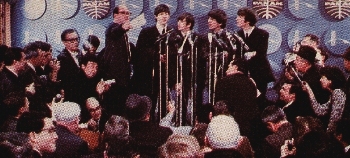Newsgroups: rec.music.beatles
Sent: Wednesday, February 07, 2001 7:53 PM
Subject: Essay for the Seventh of February
You knew you were having the time of your life.
The moments don't come along very often, sometimes not at all, in which you are entirely conscious that no time will ever be greater than the present, and that it should be savored, chronicled, brought back to the mind 's eye again and again.
It is all the more unusual that such moments should be immediately obvious to very young people, but sometimes they are.
In February 1964, they were.
The Beatles came in a crescendo that has yet to be exceeded, even in their own, glorious, musical time-telling of "A Day in the Life."
It started with a snippet here and there: a brief appearance on a TV discussion program; a quick cut of children behaving like absolute lunatics in Bootle or Torquay or Stockholm; a magazine or two that featured more fainting, screaming people; some outrageously smart comments.
And hair. There was always lots of hair.
We forget now, having lived through decades in which hairstyles that have run the gamut from high-and-tight to Elton John's Sun King look, that when The Beatles first made all those magazines back in 1963 and 1964, their heads were quite revolutionary. We didn't see the charm at first, only all that hair and the odd suits and boots that went with it.
They were a curiosity.
Then, on a cold February day in 1964, we got to see what was underneath the hair and it was substantial.
From the standpoint of one who is from the so-called "first generation" of Beatles fans (and some of us still are "Beatles" fans, plural) it is particularly ironic that they taught us best when they tried
to teach us least.
We learned that rock and roll is not necessarily grim and growling, but that it could coexist nicely with wit and humor; that what it really was about was having a good time. It was as if they said to us, "Oh, relax!"
Rock and roll became a celebration under The Beatles -- of what, can never be precisely defined - and it brought with it the most exquisitely innocent exhilaration some of us have ever known.
They spoke for us, intelligently. They allowed us to speak, intelligently.
And when they spoke to one another, they showed us how to do it with our own. Friendship, teamwork, interdependence: all the things they try so hard to teach you in school, on sports teams, in church, at home, they demonstrated by doing nothing more than acting and reacting with one
another.
"Little children, love one another," an earlier John said, but they didn't need to repeat it. We could see, and for an all-too-short time, we followed. We wanted our friendships to be like their friendship, our love of life to be as patent as theirs. For a little while they united us because we all loved them.
Ironic, again, that it was only after they realized they had the power to do so, and consciously attempted to wield it, that we were disunited. It was only after they said "be like me" that so many of us didn't want to. In the end, even as they sang and spoke so eloquently about how to live and treat loved ones, they succeeded only in showing us how not to live and treat loved ones.
Without trying, they had taught us to see through conceit and deceit; yet here they were, years later, conceited and deceiving us.
They could not convince us they didn't love one another; we were looking through them.
But it was not that way on Feb. 7, 1964. That was the day in our lives and those were The Beatles we will always see.
It, and they, remain unsurpassed.
Nurktwn is a regular contributing memember of Rec.Music.Beatles. and is also a very respected Journalist in the United States. Essay For the Seventh of February was used with permission of the author, with our thanks.

